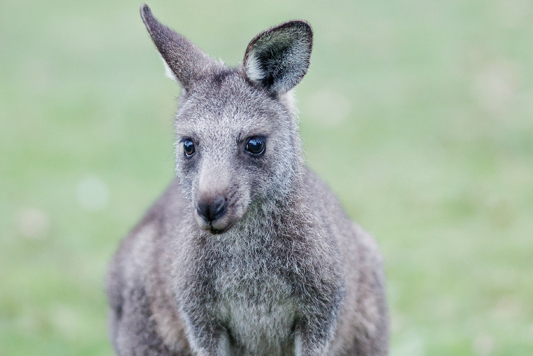STATE government departments have been accused of “digging in their heels” when it comes to moving hundreds of kangaroos trapped on a private property at Cape Schanck.
The authorised government body – Department of Energy, Environment and Climate Action – has still not approved a “soft herding” plan to remove up to 600 kangaroos trapped from the property.
Wildlife groups say that the Department of Energy, Environment and Climate Action and the Conservation Regulator have failed to act despite being aware of the animals’ situation worsening since being trapped inside fencing in 2021.
Three one-way gates were installed last year with the assistance of Mornington Peninsula Shire, but hundreds of kangaroos remain on the property.
Property manager Kenneth Neff has said he is in favour of herding the kangaroos out but has been banned from doing so by DELWP (now known as DEECA), which says herding is “inhumane”.
Wildlife group Save Kangaroos on the Mornington Peninsula (SKOMP) has unsuccessfully appealed to authorities to allow rescuers to help physically remove the animals.
A 9000-signature petition supporting the soft-herding proposal has been submitted to the state government with the backing of groups such as Animals Australia, Vets for compassion, Wildlife Victoria, the Victoria Kangaroo Alliance, the Greens and the Animal Justice Party.
Partly prompted by the Cape Schanck situation, the council last year passed a motion to focus on protecting eastern grey kangaroos – whose numbers are known to be dwindling – on the peninsula.
SKOMP’s Jo Hansen said that if soft herding was not an option, more one-way gates were needed in areas the kangaroos were already using.
Hansen said the matter was urgent, as there was “limited shelter and feed” for the kangaroos.
“The department just digs their heels in when it comes to soft-herding, but won’t provide other solutions. They say they are okay with it staying the way it is,” she said.
“The Conservation Regulator is there to protect wildlife, but isn’t, these trapped marsupials are at risk.”
DEECA responded by saying that the Conservation Regulator was “not responsible for the onsite management of wildlife on private property or when wildlife moves between properties”.
“This is the role and responsibility of land managers,” a spokesperson said.
The spokesperson said DEECA understands there is “community interest about kangaroos on the Mornington Peninsula” and has engaged in conversations with the landowner and provided advice and feedback on management options.
“There are no risk-free wildlife management options, including herding which presents risks to animal welfare as well as to the local community and environment,” the spokesperson said.
The Wildlife Act 1975 recognised sometimes there would be a need to manage wildlife populations to minimise harm to property, farmland, the environment, or people.




